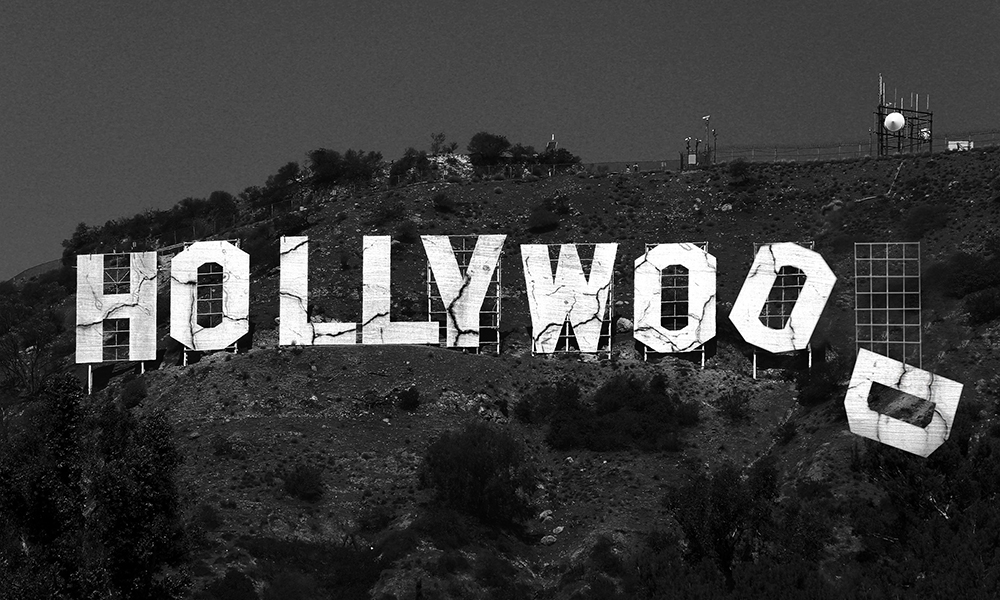
最近,“芭本海默”这个词在好莱坞已经火出圈儿了——“芭本海默”指的是《芭比》和《奥本海默》这两部新片,它们同时上映,又同时受到观众热捧,成了近年来好莱坞罕见的文化现象。
这两部片子表面上都是典型的好莱坞商业大片,但却有着截然不同的内核——华纳兄弟的出品的《芭比》聚焦女权主义语境下的矛盾,而环球公司的《奥本海默》讲述了原子弹之父的故事。这两部片子都在7月21日上映,仅在上映后的前两个周末,便合力拿下12亿美元的全球票房,成了好莱坞当之无愧的“年度电影”。
然而就在“芭本海默”欢庆大卖的背后,很多为制作这两部电影付出大量心血的影业工人却正在闹罢工,罢工者中甚至还有一些明星,比如上个月刚刚参加了《奥本海默》首映式的希里安·墨菲、艾米丽·布朗特、马特·达蒙和佛罗伦斯·珀等等,作为演员工会的成员,他们也加入了这次演员和编剧的联合罢工 。
这次罢工是由美国编剧协会(WGA)和美国电视和广播艺术家联合会(SAG-AFTRA)联合发起的,这也是1960年以来好莱坞演员和编剧的首次联合罢工。目前整个美国娱乐业都处于停摆状态,预计短期内这些影业工人是不会回来上班了。罢工者的诉求主要集中在基本的劳动保护问题,以及制片厂和流媒体公司采用的薪酬模式,此外罢工者们也抗议AI等技术在电影行业的使用。
不管这些纠纷最终如何解决,但此次罢工已经向外界揭露了一个残酷的真相——美丽、艺术、财富,这些笼罩在好莱坞头上的光环只是它呈现给外人的样子,好莱坞本质上也只是一个无聊的职场,打工人在这里依然会面临很多跟其他行业一样的问题——比如剥削、虐待和歧视等等。
除了少数拿天价片酬的一线明星,大多数演员并没有传说中那么有钱。比如SAG-AFTRA的主席弗兰·德雷斯彻指出,该组织85%以上的会员年收入还不到2.6万美元,甚至够不上享受医保的门槛。比如《女子监狱》是网剧时代第一部爆火的美剧,它也帮助奠定了Netlfix今天的地位。但最近,出演过该剧的演员们向《纽约客》爆料,他们当演员的工资甚至交不起房租,有些人不得不打第二份工来补贴家用。再比如Hulu目前的热播剧《熊家餐馆》的一位编剧表示,当该剧获得喜剧编剧奖时,他甚至连一套新西装都买不起。
“很多人有一种文化误解,觉得电影人是在追求艺术,是在追求创造性,因此好莱坞就有了更高的使命感,电影人似乎也变得高大上了起来。”莫琳·莱恩说。她是《烧毁:权力、共谋与好莱坞变革的呼声》(Burn It Down: Power, Complicity, and a Call for Change in Hollywood)一书的作者,这本书尖锐揭露了好莱坞普遍存在的一些职场问题。
“总的来说,这个行业利用这种错误认知,掩盖了大量的罪恶。”她说。
底层员工的经济待遇过低问题已经引起了很多人的愤慨。在美国,CEO的薪酬往往是普通员工的几百倍。比如华纳兄弟发现公司的CEO大卫·扎斯拉夫已经成了行业的众矢之的,因为他先是搞乱了CNN的领导层,又在特纳经典电影频道搞了一次广受非议的大裁员,后来更是为了扣税,从HBO频道下架了多部影片和剧集。2022年,他主持了华纳兄弟和探索公司的合并,并且拿到了2.47亿美元的薪酬,《财富》也将他列为“财富500强”企业中“薪酬过高”排行榜的亚军。(华纳兄弟探索公司当时就拒绝评论此事。)
如果说贫富差距问题是干柴,那么好莱坞这几年可以说一直在点火的边缘疯狂摩擦。先是制片人哈维·韦恩斯坦被指控30年骚扰女演员逾100人,再是“MeToo”运动和“奥斯卡太白”运动,这些都说明在美国娱乐业,骚扰、歧视和不公是家常便饭。这次罢工只是矛盾的一次总爆发,正如莱恩在她的书中深入揭露的那样,这些问题都一直存在。
“我知道“MeToo”运动已经过去几年了,但是我们并没有解决这些问题,实际上,我们什么问题都没有解决,这也是我写这本书的原因之一。”
早在今年的好莱坞大罢工之前,莱恩就经常报道好莱坞的各种龃龉。莱恩是一名资深记者和电视评论员,目前任《名利场》杂志的特约编辑。她花了很多时间关注好莱坞在多元和包容方面存在的问题,并曾亲自调查过美国娱乐行业的性骚扰等丑闻。
不过,等到2021年她动笔写这本书的时候,美国电影业底层员工的愤怒和牢骚已经到了掩盖不住的地步。随着行业逐步从疫情危机中复苏,人们愕然发现,流媒体时代的兴起,对多数演员、编剧和电影工人来说竟然是一场灾难。“到了去年年底,大家进入了一个非常困难的阶段,大家能勉强糊口和保住自己的房子就算不错了……我采访过的每个人都在崩溃的边缘。所以我认识到,我必须调整一下这本书的重心,不能光讲性骚扰和丑闻,也要谈谈整个行业面临的生存危机。”

莫琳·莱恩的新书《烧毁:权力、共谋与好莱坞变革的呼声》(Burn It Down: Power, Complicity, and a Call for Change in Hollywood)揭露了美国影视行业的黑幕。
哈维·韦恩斯坦因为性骚扰事件塌房已经6年了,经过轰轰烈烈的#MeToo运动,很多人都接受了这样一种观念,即作为一个社会整体来说,导致这些性骚扰事件的系统性问题已经得到解决了。
“我有一种感觉,人们已经厌倦了这个行业的剥削和虐待的故事。我懂,因为我自己也厌倦了。”
她的解决方法,就是将她的宏大主题与这些系统性问题相结合,同时在更高的视角上解读好莱坞的八卦。这本书对你最喜欢的美剧的幕后故事进行了生动、深入的挖掘报道。有些章节中的案例深刻说明了一些“有毒的职场行为”是怎样在好莱坞得到原谅和鼓励的。比如《迷失》剧组中“残酷无情”和“种族歧视”的编剧室;《周六夜现场》数十年来的“严重不当行为、种族主义、性别歧视,以及各种形式的攻击、药物滥用和精神健康问题,这些问题还因恶劣的工作条件而加剧。”另外还有极具权势的制片人斯科特·鲁丁,他长期对助理动辄打骂,人称“业内最卑鄙的老板之一”。(《迷失》的联合制片人戴蒙·林道夫向莱恩坦承他“失败了”,而《周六夜现场》的执行制片人洛恩·迈克尔斯则拒绝对莱恩的书发表评论。2021年,鲁丁宣布他将“退出”自己的百老汇项目。)
不出所料,在《名利场》杂志刊登了她书中关于《迷失》的章节节选后,莱恩的报道迅速传播开来,她的这本书也登上了《纽约时报》的畅销书排行榜。
莱恩坦承:“这是我想引起人们注意的一种方式,但这也是为了让大家意识到,如果你们认为种族歧视、性别歧视和各种施害行为已经是过去时了,那你们就大错特错了。”
莱恩这本书的独特之处在于,她没有将好莱坞当成一个艺术作品的摇篮,而是将其解构成一个职场——好莱坞的所有职场问题,是美国所有企业和打工人都能共情的。资本家希望从劳动力身上压榨利润,而工人的薪资待遇却越来越差——哪怕是那些原本薪酬更高、保障更好的所谓“白领工人”,因此双方的冲突也愈发频繁。如今的科技公司、咨询巨头、律师事务所乃至大学都在想方设法把员工变成“零工”。但一旦变成零工,你将失去工龄,失去收入稳定的收入保障,甚至无法对自己的工作成果拥有所有权。而与此同时,CEO们却在公开讨论拥抱人工智能,以及如何用AI取代那些讨厌的人类。
所以,很多口中的所谓“梦想中的工作”,就算它曾经存在过,现在也濒临灭绝了。这一点在好莱坞表现得最为明显,在创意乌托邦的光鲜神话背后,残酷的现实已经让人越来越难以忽视。
对莱恩本人来说,她的好莱坞梦很久以前就破灭了。“我儿子也是一名音乐人和制作人,我完全支持他从事这种创造性的工作。但我宁愿让他去银行当一个柜员,也不愿意让他去好莱坞工作。” 她说。(财富中文网)
译者:朴成奎
最近,“芭本海默”这个词在好莱坞已经火出圈儿了——“芭本海默”指的是《芭比》和《奥本海默》这两部新片,它们同时上映,又同时受到观众热捧,成了近年来好莱坞罕见的文化现象。
这两部片子表面上都是典型的好莱坞商业大片,但却有着截然不同的内核——华纳兄弟的出品的《芭比》聚焦女权主义语境下的矛盾,而环球公司的《奥本海默》讲述了原子弹之父的故事。这两部片子都在7月21日上映,仅在上映后的前两个周末,便合力拿下12亿美元的全球票房,成了好莱坞当之无愧的“年度电影”。
然而就在“芭本海默”欢庆大卖的背后,很多为制作这两部电影付出大量心血的影业工人却正在闹罢工,罢工者中甚至还有一些明星,比如上个月刚刚参加了《奥本海默》首映式的希里安·墨菲、艾米丽·布朗特、马特·达蒙和佛罗伦斯·珀等等,作为演员工会的成员,他们也加入了这次演员和编剧的联合罢工 。
这次罢工是由美国编剧协会(WGA)和美国电视和广播艺术家联合会(SAG-AFTRA)联合发起的,这也是1960年以来好莱坞演员和编剧的首次联合罢工。目前整个美国娱乐业都处于停摆状态,预计短期内这些影业工人是不会回来上班了。罢工者的诉求主要集中在基本的劳动保护问题,以及制片厂和流媒体公司采用的薪酬模式,此外罢工者们也抗议AI等技术在电影行业的使用。
不管这些纠纷最终如何解决,但此次罢工已经向外界揭露了一个残酷的真相——美丽、艺术、财富,这些笼罩在好莱坞头上的光环只是它呈现给外人的样子,好莱坞本质上也只是一个无聊的职场,打工人在这里依然会面临很多跟其他行业一样的问题——比如剥削、虐待和歧视等等。
除了少数拿天价片酬的一线明星,大多数演员并没有传说中那么有钱。比如SAG-AFTRA的主席弗兰·德雷斯彻指出,该组织85%以上的会员年收入还不到2.6万美元,甚至够不上享受医保的门槛。比如《女子监狱》是网剧时代第一部爆火的美剧,它也帮助奠定了Netlfix今天的地位。但最近,出演过该剧的演员们向《纽约客》爆料,他们当演员的工资甚至交不起房租,有些人不得不打第二份工来补贴家用。再比如Hulu目前的热播剧《熊家餐馆》的一位编剧表示,当该剧获得喜剧编剧奖时,他甚至连一套新西装都买不起。
“很多人有一种文化误解,觉得电影人是在追求艺术,是在追求创造性,因此好莱坞就有了更高的使命感,电影人似乎也变得高大上了起来。”莫琳·莱恩说。她是《烧毁:权力、共谋与好莱坞变革的呼声》(Burn It Down: Power, Complicity, and a Call for Change in Hollywood)一书的作者,这本书尖锐揭露了好莱坞普遍存在的一些职场问题。
“总的来说,这个行业利用这种错误认知,掩盖了大量的罪恶。”她说。
底层员工的经济待遇过低问题已经引起了很多人的愤慨。在美国,CEO的薪酬往往是普通员工的几百倍。比如华纳兄弟发现公司的CEO大卫·扎斯拉夫已经成了行业的众矢之的,因为他先是搞乱了CNN的领导层,又在特纳经典电影频道搞了一次广受非议的大裁员,后来更是为了扣税,从HBO频道下架了多部影片和剧集。2022年,他主持了华纳兄弟和探索公司的合并,并且拿到了2.47亿美元的薪酬,《财富》也将他列为“财富500强”企业中“薪酬过高”排行榜的亚军。(华纳兄弟探索公司当时就拒绝评论此事。)
如果说贫富差距问题是干柴,那么好莱坞这几年可以说一直在点火的边缘疯狂摩擦。先是制片人哈维·韦恩斯坦被指控30年骚扰女演员逾100人,再是“MeToo”运动和“奥斯卡太白”运动,这些都说明在美国娱乐业,骚扰、歧视和不公是家常便饭。这次罢工只是矛盾的一次总爆发,正如莱恩在她的书中深入揭露的那样,这些问题都一直存在。
“我知道“MeToo”运动已经过去几年了,但是我们并没有解决这些问题,实际上,我们什么问题都没有解决,这也是我写这本书的原因之一。”
早在今年的好莱坞大罢工之前,莱恩就经常报道好莱坞的各种龃龉。莱恩是一名资深记者和电视评论员,目前任《名利场》杂志的特约编辑。她花了很多时间关注好莱坞在多元和包容方面存在的问题,并曾亲自调查过美国娱乐行业的性骚扰等丑闻。
不过,等到2021年她动笔写这本书的时候,美国电影业底层员工的愤怒和牢骚已经到了掩盖不住的地步。随着行业逐步从疫情危机中复苏,人们愕然发现,流媒体时代的兴起,对多数演员、编剧和电影工人来说竟然是一场灾难。“到了去年年底,大家进入了一个非常困难的阶段,大家能勉强糊口和保住自己的房子就算不错了……我采访过的每个人都在崩溃的边缘。所以我认识到,我必须调整一下这本书的重心,不能光讲性骚扰和丑闻,也要谈谈整个行业面临的生存危机。”
莫琳·莱恩的新书《烧毁:权力、共谋与好莱坞变革的呼声》(Burn It Down: Power, Complicity, and a Call for Change in Hollywood)揭露了美国影视行业的黑幕。
哈维·韦恩斯坦因为性骚扰事件塌房已经6年了,经过轰轰烈烈的#MeToo运动,很多人都接受了这样一种观念,即作为一个社会整体来说,导致这些性骚扰事件的系统性问题已经得到解决了。
“我有一种感觉,人们已经厌倦了这个行业的剥削和虐待的故事。我懂,因为我自己也厌倦了。”
她的解决方法,就是将她的宏大主题与这些系统性问题相结合,同时在更高的视角上解读好莱坞的八卦。这本书对你最喜欢的美剧的幕后故事进行了生动、深入的挖掘报道。有些章节中的案例深刻说明了一些“有毒的职场行为”是怎样在好莱坞得到原谅和鼓励的。比如《迷失》剧组中“残酷无情”和“种族歧视”的编剧室;《周六夜现场》数十年来的“严重不当行为、种族主义、性别歧视,以及各种形式的攻击、药物滥用和精神健康问题,这些问题还因恶劣的工作条件而加剧。”另外还有极具权势的制片人斯科特·鲁丁,他长期对助理动辄打骂,人称“业内最卑鄙的老板之一”。(《迷失》的联合制片人戴蒙·林道夫向莱恩坦承他“失败了”,而《周六夜现场》的执行制片人洛恩·迈克尔斯则拒绝对莱恩的书发表评论。2021年,鲁丁宣布他将“退出”自己的百老汇项目。)
不出所料,在《名利场》杂志刊登了她书中关于《迷失》的章节节选后,莱恩的报道迅速传播开来,她的这本书也登上了《纽约时报》的畅销书排行榜。
莱恩坦承:“这是我想引起人们注意的一种方式,但这也是为了让大家意识到,如果你们认为种族歧视、性别歧视和各种施害行为已经是过去时了,那你们就大错特错了。”
莱恩这本书的独特之处在于,她没有将好莱坞当成一个艺术作品的摇篮,而是将其解构成一个职场——好莱坞的所有职场问题,是美国所有企业和打工人都能共情的。资本家希望从劳动力身上压榨利润,而工人的薪资待遇却越来越差——哪怕是那些原本薪酬更高、保障更好的所谓“白领工人”,因此双方的冲突也愈发频繁。如今的科技公司、咨询巨头、律师事务所乃至大学都在想方设法把员工变成“零工”。但一旦变成零工,你将失去工龄,失去收入稳定的收入保障,甚至无法对自己的工作成果拥有所有权。而与此同时,CEO们却在公开讨论拥抱人工智能,以及如何用AI取代那些讨厌的人类。
所以,很多口中的所谓“梦想中的工作”,就算它曾经存在过,现在也濒临灭绝了。这一点在好莱坞表现得最为明显,在创意乌托邦的光鲜神话背后,残酷的现实已经让人越来越难以忽视。
对莱恩本人来说,她的好莱坞梦很久以前就破灭了。“我儿子也是一名音乐人和制作人,我完全支持他从事这种创造性的工作。但我宁愿让他去银行当一个柜员,也不愿意让他去好莱坞工作。” 她说。(财富中文网)
译者:朴成奎
Hollywood’s “Barbenheimer” extravaganza, bristling with industry tension, has turned into one of corporate America’s weirder public celebrations in recent memory.
The surface was all Hollywood glitz and glamour: Two very different films—Warner Bros.’ Barbie, about the feminist contradictions of an iconic doll, and Universal’s Oppenheimer, about the anguished maker of the atomic bomb—were both released July 21 and earned a combined $1.2 billion in global ticket sales over their first two weekends, generating headlines about “the movie event of the year.”
But behind the celebratory scenes, many of the Hollywood workers who actually created these business hits are on strike. Those workers include the stars, as was vividly illustrated by Cillian Murphy, Emily Blunt, Matt Damon, and Florence Pugh walking out of an Oppenheimer premiere last month, as the actors’ union joined striking writers.
The double strikes of the Writers Guild of America (WGA) and the Screen Actors Guild–American Federation of Television and Radio Artists (SAG-AFTRA)—the first such joint action since 1960—have effectively shut down the entertainment industry. And the workers are not expected to come back anytime soon. At stake are basic workplace protections and pay models used by movie studios and streaming companies, as well as these employers’ use of artificial intelligence and other technology.
But however these labor disputes are resolved, the revelations that have come out of them have already undermined much of Hollywood’s carefully crafted reputation as a land of beauty, art, and wealth. Instead, it’s becoming clear, this is just another boring old workplace, where workers face many of the same problems—exploitation, abuse, discrimination—they encounter elsewhere in corporate America.
Behind the headline salaries of A-list celebrities, most on-screen actors don’t have access to all that fabled wealth. More than 85% of those represented by SAG-AFTRA don’t make the $26,000 annually needed to qualify for health benefits, according to union president Fran Drescher. Actors in Orange Is the New Black—one of the first breakout hits of the streaming era, which helped put Netflix on the map—recently told The New Yorker they were paid so little that some had to take second jobs in order to afford their rent. One of the writers for The Bear, Hulu’s current buzzy darling, has said he couldn’t afford a new suit when the show won an award for comedy writing.
“There is this huge cultural myth that, because people are pursuing artistic or creative goals, Hollywood has some higher purpose—and a better reputation,” says Maureen Ryan, author of Burn It Down: Power, Complicity, and a Call for Change in Hollywood, a scathing new book on the entertainment industry’s pervasive workplace problems.
“As a whole,” she adds, “the industry has used that false perception to cover up a multitude of sins.”
These stories of rank-and-file economic misery have fueled an outrage common across corporate America, where the average CEO makes several hundred times what they pay a typical employee. Warner Bros. Discovery CEO David Zaslav, for example, has become an industry lightning rod after presiding over the leadership turmoil at CNN, widely criticized layoffs at Turner Classic Movies, and the coldly financial decisions to make movies and TV shows disappear from HBO (or never release them in the first place) for tax write-offs. In 2022, as he orchestrated the merger of Warner and Discovery and was awarded a compensation package worth $247 million, Fortune named Zaslav the second-most “overpaid” CEO on the Fortune 500. (Warner Bros. Discovery declined to comment on the ranking at the time.)
But if financial disparities between executives and workers are the tinder, to borrow Ryan’s Burn It Down metaphor, Hollywood has been stockpiling the fuel for years. After Harvey Weinstein, #MeToo, #OscarsSoWhite, and waves of other reckonings over widespread inequality, discrimination, and harassment in the entertainment industry, the cumulative effect of striking workers’ stories has laid bare the fundamental workplace problems that, as Ryan’s book deeply reports, have always existed.
“Part of the reason I wrote the book was to say, ‘Look, I know we’re a few years on from #MeToo. But…guys, we didn’t fix it,’” she says. “Nothing is fixed.”
Ryan was covering various tensions in Hollywood long before this year’s strikes began. A veteran reporter and TV critic who’s currently a contributing editor at Vanity Fair, she has spent much of her career covering Hollywood’s problems with diversity and inclusion, and investigating sexual harassment and other examples of workplace misconduct across the entertainment industry.
But by the time she started writing her book in 2021, the rumblings of broader labor unrest were hard to ignore. As the entertainment industry started to come out of the existential crisis caused by the pandemic, it was increasingly clear that the “golden age of streaming” was a financial disaster for most writers, actors, and other workers. “By the end of last year, it seems to have gotten to such a very difficult stage in terms of people just being able to pay their bills and keep their houses that…everyone I spoke to was at a boiling point of frustration,” Ryan says. “I realized that I had to pivot the book a bit more, to not just issues of harassment, abuse, and misconduct…but the existential crises facing the industry.”
Maureen Ryan’s new book, “Burn It Down: Power, Complicity, and a Call for Change in Hollywood,” explores the toxic experiences of working in film and TV.
Expanding her focus also helped address a frustrating dilemma of the post-#MeToo era: Almost six years after Harvey Weinstein’s downfall, many are eager to embrace the idea that Hollywood—and for that matter all of society—has “fixed” the systemic problems that made his abuses possible.
“I had the sense that people were tired of stories about misconduct, mistreatment, abuse, and exploitation in the industry,” Ryan says. “I get it, because I get tired of it.”
Her solution was to marry her larger thesis about these ongoing, systemic problems with a high-minded version of Hollywood gossip: juicy, headline-grabbing, deep reporting about the awful things that were really going on behind the scenes of your favorite TV show. Some of her book’s best chapters dive into nuanced and upsetting examples of how “toxic workplace behavior” has been condoned and rewarded across Hollywood. Case studies include Lost’s “relentlessly cruel” and “racist” writers room; Saturday Night Live’s decades of “gross misconduct, racism, sexism, abusive dynamics, various forms of assault, substance abuse, and mental health struggles exacerbated by punishing working conditions”; and the long track record of powerful producer Scott Rudin, widely reported to be physically abusive toward his assistants and “one of the vilest bosses in the industry.” (Lost cocreator Damon Lindelof acknowledged to Ryan that he “failed,” while SNL executive producer Lorne Michaels declined to comment for her book. In 2021, Rudin announced that he would “step back” from his projects.)
Sure enough, after Vanity Fair ran a Burn It Down excerpt about Lost, Ryan’s reporting went viral—and vaulted her book onto the New York Times bestseller list.
“That was part of the way that I thought I would get people’s attention,” Ryan acknowledges, “but it was also just to point out that, if people think that moments of racial [and] sexist bias” and generally abusive behavior “are gone, they’re very much mistaken.”
Ryan savvily presents Hollywood and the entertainment industry not just as the wellspring of your favorite movies and TV shows, but as a workplace—with all the workplace problems that are familiar across corporate America. Disputes between employers, eager to squeeze all possible profits and shareholder value out of their labor force, and the workers actually creating the product are increasing outside of Tinseltown, too—including for white-collar or “knowledge” jobs that were once widely considered to be better paid, more prestigious, and more protected. Today, law firms, consulting giants, tech companies, and universities are trying to turn employees into, essentially, gig workers without job longevity or the security of a consistent paycheck, let alone ownership of their work output. CEOs publicly discuss embracing A.I.—and boast about using it to replace those pesky humans.
So the “dream job,” if it ever existed, is endangered everywhere these days. Nowhere is that more evident than in Hollywood, where the grim reality beneath the shiny myth of a creative utopia is increasingly hard to ignore.
For Ryan herself, that Hollywood dream was deflated long ago. “My son is a musician and a producer, and I support his creative work completely,” she told me. “But I would rather have him go work as a teller in a bank than work on a Hollywood set.”






